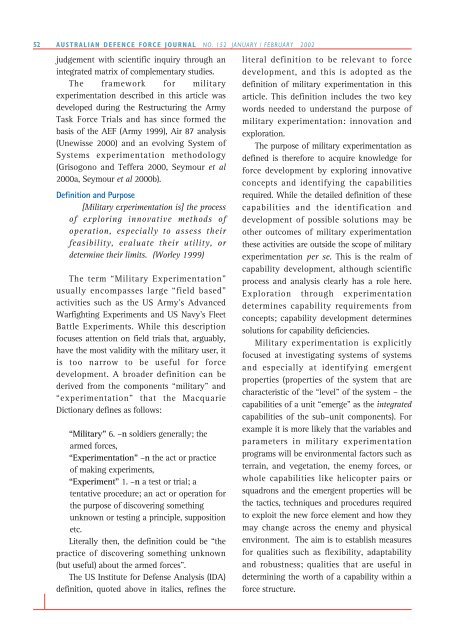ISSUE 152 : Jan/Feb - 2002 - Australian Defence Force Journal
ISSUE 152 : Jan/Feb - 2002 - Australian Defence Force Journal
ISSUE 152 : Jan/Feb - 2002 - Australian Defence Force Journal
- No tags were found...
Create successful ePaper yourself
Turn your PDF publications into a flip-book with our unique Google optimized e-Paper software.
52AUSTRALIAN DEFENCE FORCE JOURNAL NO. <strong>152</strong> JANUARY / FEBRUARY <strong>2002</strong>judgement with scientific inquiry through anintegrated matrix of complementary studies.The framework for militaryexperimentation described in this article wasdeveloped during the Restructuring the ArmyTask <strong>Force</strong> Trials and has since formed thebasis of the AEF (Army 1999), Air 87 analysis(Unewisse 2000) and an evolving System ofSystems experimentation methodology(Grisogono and Teffera 2000, Seymour et al2000a, Seymour et al 2000b).Definition and Purpose[Military experimentation is] the processof exploring innovative methods ofoperation, especially to assess theirfeasibility, evaluate their utility, ordetermine their limits. (Worley 1999)The term “Military Experimentation”usually encompasses large “field based”activities such as the US Army’s AdvancedWarfighting Experiments and US Navy’s FleetBattle Experiments. While this descriptionfocuses attention on field trials that, arguably,have the most validity with the military user, itis too narrow to be useful for forcedevelopment. A broader definition can bederived from the components “military” and“experimentation” that the MacquarieDictionary defines as follows:“Military” 6. –n soldiers generally; thearmed forces,“Experimentation” –n the act or practiceof making experiments,“Experiment” 1. –n a test or trial; atentative procedure; an act or operation forthe purpose of discovering somethingunknown or testing a principle, suppositionetc.Literally then, the definition could be “thepractice of discovering something unknown(but useful) about the armed forces”.The US Institute for Defense Analysis (IDA)definition, quoted above in italics, refines theliteral definition to be relevant to forcedevelopment, and this is adopted as thedefinition of military experimentation in thisarticle. This definition includes the two keywords needed to understand the purpose ofmilitary experimentation: innovation andexploration.The purpose of military experimentation asdefined is therefore to acquire knowledge forforce development by exploring innovativeconcepts and identifying the capabilitiesrequired. While the detailed definition of thesecapabilities and the identification anddevelopment of possible solutions may beother outcomes of military experimentationthese activities are outside the scope of militaryexperimentation per se. This is the realm ofcapability development, although scientificprocess and analysis clearly has a role here.Exploration through experimentationdetermines capability requirements fromconcepts; capability development determinessolutions for capability deficiencies.Military experimentation is explicitlyfocused at investigating systems of systemsand especially at identifying emergentproperties (properties of the system that arecharacteristic of the “level” of the system – thecapabilities of a unit “emerge” as the integratedcapabilities of the sub–unit components). Forexample it is more likely that the variables andparameters in military experimentationprograms will be environmental factors such asterrain, and vegetation, the enemy forces, orwhole capabilities like helicopter pairs orsquadrons and the emergent properties will bethe tactics, techniques and procedures requiredto exploit the new force element and how theymay change across the enemy and physicalenvironment. The aim is to establish measuresfor qualities such as flexibility, adaptabilityand robustness; qualities that are useful indetermining the worth of a capability within aforce structure.
















